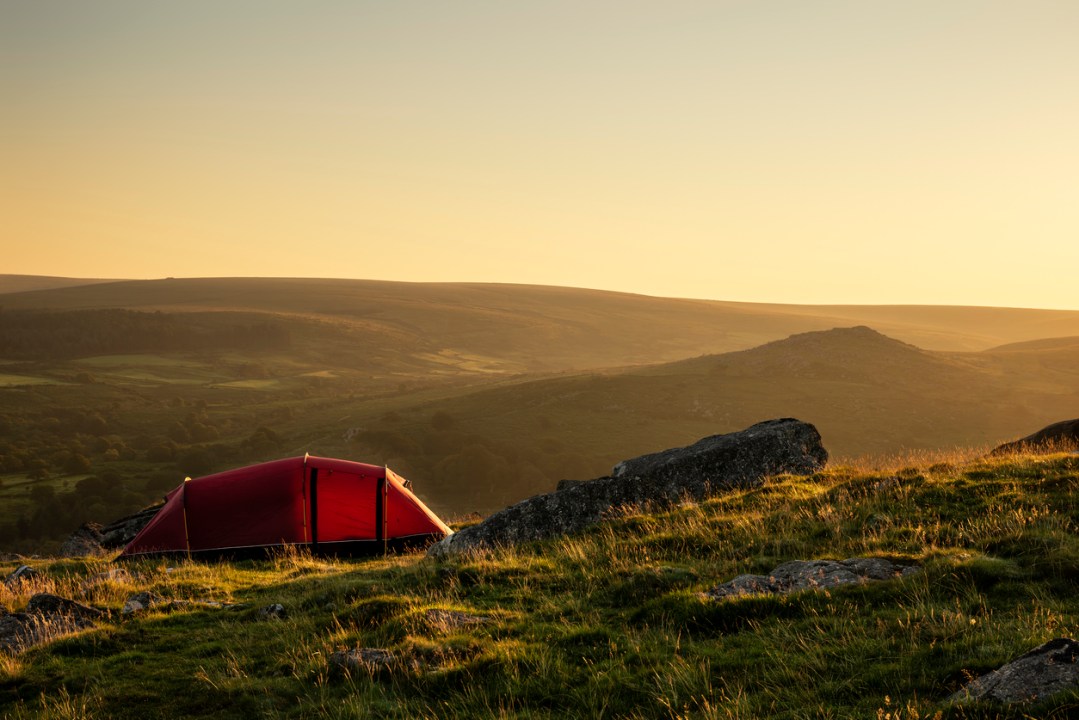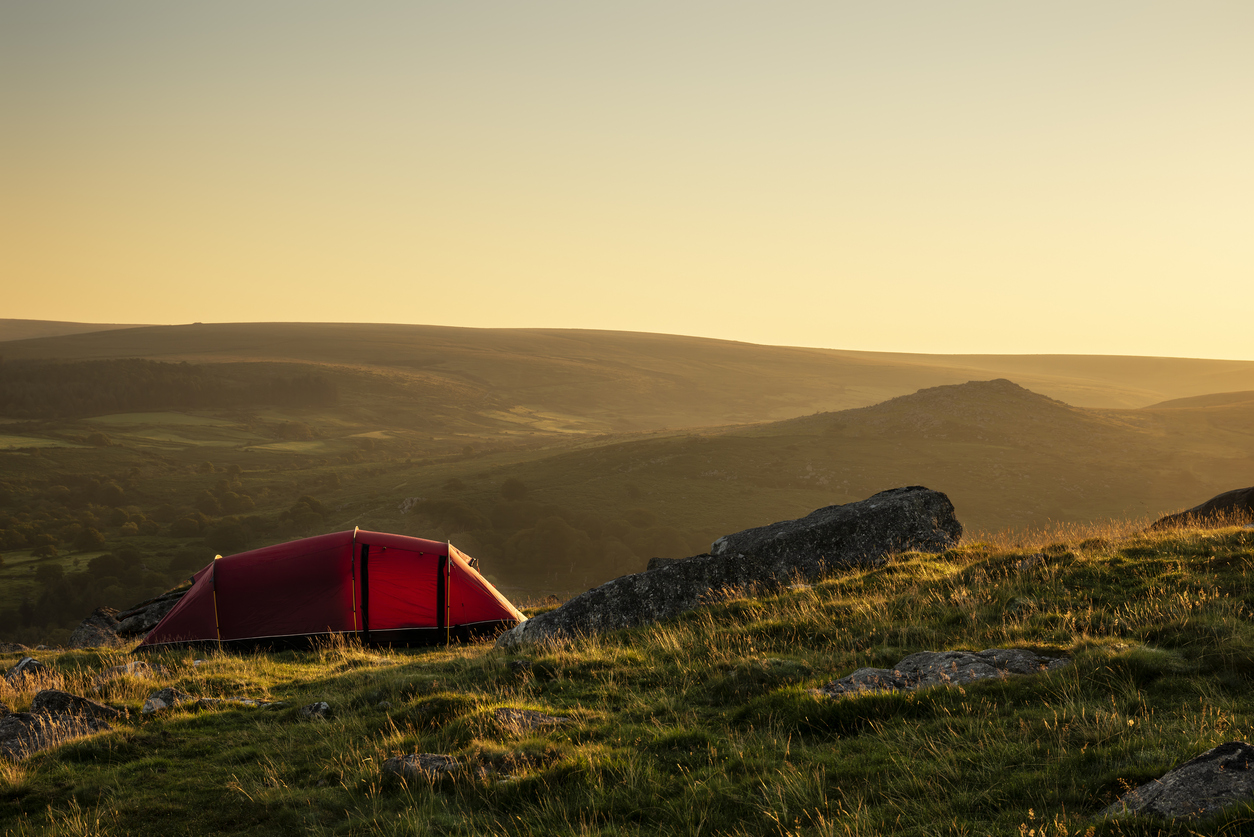Wild camping is ‘a modish phrase meaning camping overnight in a place which is not a dedicated campsite’, according to Lord Justice Underhill in a Court of Appeal judgment in July – and isn’t it wonderful that there are still judges carrying on the fine judicial tradition of handling the colloquial as if were radioactive waste? The point at issue was whether wild camping came within the definition of ‘open-air recreation’ – which is legally protected on Dartmoor, even without the landowner’s permission, under the Dartmoor Commons Act 1985 – or not.
I had always thought of camping as what you do if can’t stretch to a hotel
A nice question of statutory interpretation with no real repercussions, as the landowners promised that they would (at least for the moment) grant that permission, which was resolved by the Master of the Rolls. The judges reasoning was that a walker who stopped for a rest was still taking part in open-air recreation, even if he fell asleep; it was an essential part of his recreation. I also like judges who have a proper respect for the nap.
It was after reading about the case that I decided to try wild camping. Not just because of my admiration for the judicial reasoning – although I admit I do get excited by jurisprudence; I once got off on a technicality – but I think my life was leading me there. During lockdown, my wife bought me a T-shirt from Mountain Warehouse with the slogan ‘Social distancing before it was cool’: I had never been walking in the wilderness, as the pictures of mountains and moors implied, but the misanthropy was all mine.
I once asked a lesbian chum, who had just returned from the South West coastal path, what it was about hiking that lesbians liked so much. And she thought for a moment, and then said, ‘Well, we’ve got the kit – the sensible shoes, the shapeless cagoule – we might as well use it.’ And I was the same. It might have stayed an ambition – one of those things I think that I must take up – and an aesthetic, had I not had to take my son to a cricket match one weekend in August. There was no room at the Travelodge; a tent was the only solution.
That first trip was an experiment. I could only persuade my family to wander a few hundred yards from our parked car. I cooked a boil-in-the-bag survival pack (‘chilli and rice’, apparently) over a camping stove – it would probably have tasted all right if you had actually been relying on it for survival – with water collected from a nearby stream. I made sure I left ‘no trace’, as the guides to wild camping enjoin. I even brought a trowel from my garden to make a cathole – which is what we wild camping types call the hole you dig for a toilet.
The idea is that you dig up a sod of earth and lift it to one side, and then replace it when you are finished, laying it down as if you were just planting turf. It is important, however, not to misjudge the size of the hole: you will understand why if you have ever made a Victoria sponge and overestimated the amount of buttercream you need for the middle. The first time I tried it (of course it had to be the middle of the night) my son was awoken from his sleep by my shouting about a stupid sod – which is not (I promised him) swearing when it refers to a slice of earth of moderate thickness together with the grass growing on it.
And then, as I took the 70 recommended steps back to the tent, I realised that the cathole was the only blot on the landscape. I was in the middle of the most beautiful countryside in southern England, miles away from any house or streetlamp or person that I did not love. No one could text me or email me or ask me to do any DIY that couldn’t be completed within five minutes. I have never felt so at peace.
My family disagreed. My wife was bitten by midges all night; my son was traumatised that he’d missed Film Night for this. Even the dog had looked as if he were nursing a secret resentment for the whole weekend. Very well then – alone. I was back three weeks later to do it again.
I took the train to the end of the line (Okehampton station is very much the end of the line, not a terminus) and strode off in what my new compass told me was a southerly direction. I had hit Mountain Warehouse again – the importance of kit as a driver of this new obsession cannot be denied – and the man leaving the National Hiking Centre saw my brand new rucksack and managed, with visible effort, not to give me advice, for which I was very grateful.
I walked through bracken and wooded valleys and moors and then, when I was tired and the light was fading, I just stopped where I was and slept. I didn’t realise what a perfect site I had chosen until very early the next morning, when I found I was next to a pool that was deep enough to swim in. (I am not going to use the modish phrase ‘wild swimming’, although doubtless the parade of middle-aged women who appeared later in the morning would. It was lucky that I was dressed by the time they arrived – the towel I had been recommended was the size of a face flannel: good to avoid carrying a wet bath towel all day, but not enough to protect your modesty from people with their own – or the Guardian’s – definition of ‘wild’.) And then I got up and carried on walking.
I’ve never really cared for camping before. But before I had always thought of camping as what you do if can’t stretch to a hotel. Wild camping makes you think the other way – instead of an inferior version of a hotel, it is a superior version of a hike. Or – and there is, for now, binding authority for this – as an essential part of it. The landowner has been granted leave to appeal to the Supreme Court.







Comments